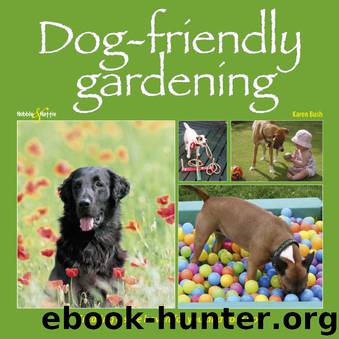Dog-friendly Gardening by Karen Bush

Author:Karen Bush
Language: eng
Format: epub
ISBN: 9781845845384
Publisher: Veloce Publishing Ltd
Published: 2014-01-03T05:00:00+00:00
Make sure compost heaps can’t be accessed by your dog.
Mulches
Mulches laid on the soil surface can help suppress weeds, conserve water, protect from winter frost, and enhance the appearance of a flowerbed. Some can also deter certain pests, and – if uncomfortable to walk on – may discourage your dog from digging or playing in flowerbeds.
You can use organic substances including compost, bark chips, newspaper, cardboard and dried grass clippings, or inorganic materials such as gravel, pebbles, cobbles, seashells and coloured glass pebbles. Inorganic mulches tend to be expensive but long lasting; organic ones will rot down in time and need to be topped up – although this does have benefits in that it will improve soil quality.
Some mulches can also affect soil ph, so you may need to check this occasionally, or if your plants begin to look a little peaky.
Although they can be beneficial for your garden, not all mulches are good news for your dog. If you have one that likes to pick up and play with stones, avoid pebbles, cobbles and glass beads, and when selecting inorganic mulches, pick those which have rounded rather than sharp edges that will cut paws if walked on.
Never use cocoa shell mulch: this looks good and smells as delicious to dogs as it does to us, with the result that your dog may be tempted to eat it, with potentially fatal consequences. A by-product of the chocolate industry, the hulls contain theobromine, a chemical that dogs are especially sensitive to, and which can lead to the same symptoms as with chocolate poisoning. Spent hops, another by-product, can also be a popular mulch, but is also toxic to dogs.
Coconut fibre mulches are also best avoided if there is any risk at all of your dog ingesting them, as they can absorb up to ten times their own weight of water and will swell in the gut, causing a blockage. Coir briquettes are small, light and easy to store compared with other compost products, but can be equally dangerous if your dog gets hold of one and decides it’s fun to chew on.
Not all wood bark or chip products may be suitable, either: the antifungal and flea and tick repelling properties of cedar make it attractive to dog owners, but concerns about its safety have been expressed. The essential oils and resins it contains can cause skin irritations in some animals, and if ingested, may cause vomiting and drooling.
The same applies to pine and spruce, whilst any wood mulch can cause gut blockages. Pine needles can be great for areas around acid-loving plants, but not so good if they penetrate the skin between toes and pads, or the mouth and gut; rubber chips are long lasting but could be lethal if eaten. Although it may seem unlikely, it doesn’t mean your dog might not try to eat any of the foregoing: there really is no accounting for some of the things that dogs might put in their mouths and swallow.
Choose untreated products,
Download
This site does not store any files on its server. We only index and link to content provided by other sites. Please contact the content providers to delete copyright contents if any and email us, we'll remove relevant links or contents immediately.
Turbulence by E. J. Noyes(8055)
The Thirst by Nesbo Jo(6946)
Gerald's Game by Stephen King(4656)
Be in a Treehouse by Pete Nelson(4055)
Marijuana Grower's Handbook by Ed Rosenthal(3689)
The Sprouting Book by Ann Wigmore(3593)
The Red Files by Lee Winter(3417)
The Remains of the Day by Kazuo Ishiguro(3414)
Sharp Objects: A Novel by Gillian Flynn(3018)
Christian (The Protectors Book 1) by L. Ann Marie(2694)
Organic Mushroom Farming and Mycoremediation by Tradd Cotter(2692)
The Culinary Herbal by Susan Belsinger(2480)
Stone Building by Kevin Gardner(2394)
The Starter Garden Handbook by Alice Mary Alvrez(2341)
Lilac Girls by Martha Hall Kelly(2308)
The Unlikely Pilgrimage of Harold Fry by Rachel Joyce(2273)
The Lean Farm Guide to Growing Vegetables: More In-Depth Lean Techniques for Efficient Organic Production by Ben Hartman(2137)
Urban Farming by Thomas Fox(2104)
Backyard Woodland by Josh VanBrakle(1932)
